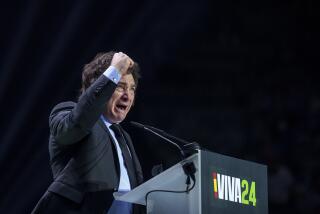Anti-NATO Forces Stronger : Political Problems Left for Gonzalez
- Share via
MADRID — President Reagan left Spain early Wednesday with the air of a satisfied guest, but he left his Spanish hosts with a number of nettlesome problems.
Many observers are certain that Prime Minister Felipe Gonzalez, despite his extraordinary popularity, will find it difficult to deal with the political aftermath of Reagan’s two-day official visit.
Although U.S. officials minimized the significance of the anti-Reagan demonstrations in Spain on the eve of the President’s arrival, officials of Spain’s Socialist government are concerned. In their view, the most vulnerable target of the demonstrations was Gonzalez, not Reagan.
The Spanish leader’s immediate task is to shore up his campaign to keep Spain in the North Atlantic Treaty Organization. Even before the Reagan visit, most polls showed that Spanish voters would reject NATO if a referendum on the subject, promised for next year, were held now.
New Anti-NATO Vigor
The anti-Reagan demonstrations, with their frenzied chants against NATO and against the four U.S. bases in Spain, have heightened the country’s pacifist feelings and given new vigor and impetus to the anti-NATO forces.
On top of this, there seems to be a feeling, reflected in the Spanish press, that Gonzalez, with his natural hospitality, lost an opportunity to stand up to Reagan and present Spain’s views forcefully, especially on Nicaragua.
A cartoon that appeared Wednesday in the Madrid newspaper Diario 16 showed an angry Reagan spanking the bare bottom of a childish Gonzalez for scrawling across the walls of a room, “Yanquis, go home.”
In an editorial, El Pais, Spain’s largest and most influential newspaper, summed up the situation by concluding that “the Socialist government now has its hands full with the domestic political repercussions of the visit.”
El Pais insisted that Spain “has received nothing substantial from this visit” and chided Gonzalez for “losing a golden opportunity to publicly and explicitly state the Spanish positions on Nicaragua and Western security.”
Moderate Streak
This attack did not come from the Spanish right. Both Diario 16 and El Pais are regarded as newspapers of the left, often friendly toward Gonzalez but sometimes suspicious about the strong moderate streak in his Socialist ideology.
Gonzalez, who campaigned against NATO in the last election but changed his mind after taking office, had to employ his most persuasive rhetorical talents to bring his Socialist Party around to reluctantly endorsing NATO at the party congress in December.
It is obvious from the polls and the anti-Reagan demonstrations that he will have to be even more persuasive in the months ahead to change the view of the electorate.
Some analysts believe that the cause is hopeless and that Gonzalez, to salvage the situation, will cancel the referendum and hold a general election instead, interpreting a victory as endorsement of NATO. No political analyst here doubts that Gonzalez could win any election with ease.
The Reagan visit added so much tension to the political scene that many Spaniards are wondering why the Gonzalez government invited him in the first place.
Government Creation
Miguel Roca, a deputy from Barcelona who is considered one of the most promising politicians in the center, said that “the paradox is that the government itself created the tense atmosphere by inviting Reagan; it would have been better not to do so.”
The government, however, had no way of knowing that the Reagan Administration would impose a trade embargo on Nicaragua just a few days before arriving in Madrid. That step galvanized public opinion in a dramatic and emotional way, for in Spanish eyes it swept all images into one: Yankee imperialism, American bases, NATO, American support for the late dictator Francisco Franco and the Cold War rhetoric of Reagan.
Originally, the Gonzalez government wanted the visit to serve as a kind of American endorsement of Spanish democracy. Breaking out of its isolation after 40 years of Franco dictatorship and 10 years of transition to democracy, Spain seems to feel the need for public encouragement of its new ways.
From this psychological point of view, the Reagan visit was a success for the Gonzalez government. Reagan praised the new Spanish democracy in ringing tones, and even El Pais agreed that Reagan’s words would help Spain forget “the ominous declaration” of former Secretary of State Alexander M. Haig Jr. when Francoist members of the Civil Guard and the Spanish army tried to overthrow the new democracy in 1982.
Infuriated Spaniards
Haig, when asked to comment on the attempted coup, described it as an internal Spanish matter. The remark infuriated democratic Spaniards.
But although Gonzalez did win high praise from the American President, he did not, in the opinion of analysts here, win much else.
More to Read
Sign up for Essential California
The most important California stories and recommendations in your inbox every morning.
You may occasionally receive promotional content from the Los Angeles Times.













